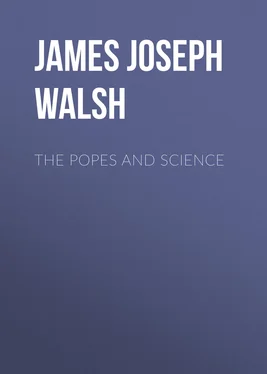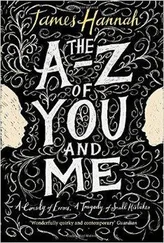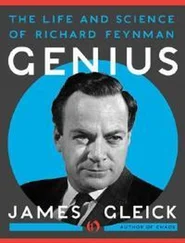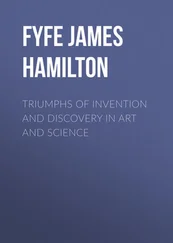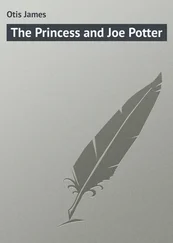James Walsh - The Popes and Science
Здесь есть возможность читать онлайн «James Walsh - The Popes and Science» — ознакомительный отрывок электронной книги совершенно бесплатно, а после прочтения отрывка купить полную версию. В некоторых случаях можно слушать аудио, скачать через торрент в формате fb2 и присутствует краткое содержание. Жанр: foreign_prose, foreign_religion, foreign_antique, на английском языке. Описание произведения, (предисловие) а так же отзывы посетителей доступны на портале библиотеки ЛибКат.
- Название:The Popes and Science
- Автор:
- Жанр:
- Год:неизвестен
- ISBN:нет данных
- Рейтинг книги:4 / 5. Голосов: 1
-
Избранное:Добавить в избранное
- Отзывы:
-
Ваша оценка:
- 80
- 1
- 2
- 3
- 4
- 5
The Popes and Science: краткое содержание, описание и аннотация
Предлагаем к чтению аннотацию, описание, краткое содержание или предисловие (зависит от того, что написал сам автор книги «The Popes and Science»). Если вы не нашли необходимую информацию о книге — напишите в комментариях, мы постараемся отыскать её.
The Popes and Science — читать онлайн ознакомительный отрывок
Ниже представлен текст книги, разбитый по страницам. Система сохранения места последней прочитанной страницы, позволяет с удобством читать онлайн бесплатно книгу «The Popes and Science», без необходимости каждый раз заново искать на чём Вы остановились. Поставьте закладку, и сможете в любой момент перейти на страницу, на которой закончили чтение.
Интервал:
Закладка:
Professor White has gone much farther than Sir Michael Foster. The English physiologist knew too much about the history of medicine in Italy even to hint at any ecclesiastical opposition with regard to Vesalius. President White, however, has no scruples in the matter. This makes an excellent opportunity to write the kind of history that is to be found in his book. Apparently forgetful of the thought that the Emperor Charles V. was not at all likely to take as his body physician a man who had been in trouble with the ecclesiastical authorities in Italy, he insists that the reason why Vesalius dedicated his great work on anatomy to the Emperor Charles V. was "to shield himself as far as possible in the battle which he foresaw must come." Later he suggests that it was only the favor of the Emperor saved him from the ecclesiastical authorities.
All that has been said by historians with regard to the reasons for Vesalius's acceptance of the post of physician to the Emperor Charles V. can only have come from men who either did not know or had for the moment forgotten the story of Vesalius's ancestry. The family tradition of having one of its members as physician to the Court of the German Emperor was four generations old when Vesalius accepted the position.
Vesalius's great-grandfather occupied the position of physician-in-ordinary to Marie of Burgundy, the wife of the German Emperor Maximilian I., the distinguished patron of letters in the Renaissance period. He lived to an advanced age as a professor of medicine at Louvain. From this time on Vesalius's family always continued in official medical relation to the Austrian-Burgundy ruling family. His grandfather took his father's place as physician to Mary of Burgundy, and wrote a series of commentaries on the aphorisms of Hippocrates. Vesalius's father was the physician and apothecary to Charles V. for a while, and accompanied the Emperor on journeys and campaigns. What more natural than that his son, having reached the distinction of being the greatest medical scientist alive, should be offered, and as a matter of course accept the post of imperial physician!
The simple facts of the matter are that Vesalius came down into Italy in order to study anatomy, because in that priest-ridden and ecclesiastically-ruled country he could get better opportunities for anatomical study and investigation than anywhere else in Europe. He spent ten years there and then wrote his classical work on anatomy. After that he spent some years applying anatomy to medicine. Then when he had come to be the acknowledged leader of the medical profession of the world, the Emperor Charles V., at that time the greatest ruler in Europe, asked him to become his court physician. Vesalius accepted, as would any other medical investigator that I have ever known, under the same circumstances. His position with Charles V. gave him opportunities to act as consultant for many of the most important personages of Europe, and it must not be forgotten that when the King of France was injured in a tournament Vesalius was summoned all the way from Madrid, and gave a bad prognosis in the case.
In the light of this simple story of Vesalius's life in Italy, and of the reasons for his going there and his departure, it is intensely amusing to read the accounts of this portion of Vesalius's life, written by those who must maintain at all costs the historical tradition that the Church was opposed to anatomy, that the Popes had forbidden dissection, and that the ecclesiastical authorities were constantly on the watch to hamper, as far as possible at least, if not absolutely to prevent, all anatomical investigation, and were even ready to put to death those who violated the ecclesiastical regulations in this matter. Dr. White, for instance, has made a great hero of Vesalius for daring to do dissection. He was only doing what hundreds of others were doing and had been doing in Italy for hundreds of years; but to confess this would be to admit that the Church was not opposed to anatomy or the practice of dissection, and so perforce Vesalius must be a hero as well as the Father of Anatomy. To read Dr. White's paragraph in the History of the Warfare of Science with Theology, one cannot but feel sure that Vesalius must practically have risked death over and over again in order to pursue his favorite practice of dissection and his original researches in anatomy. I would be the last one in the world to wish to minimize in any way Vesalius's merits. He was a genius, a great discoverer–above all an inspiration to methods of study that have been most fruitful in their results, and withal a devout Christian and firm adherent of the Roman Catholic Church. He was not a hero in the matter of dissection, however, for there was no necessity for heroism. Dissection had been practiced very assiduously before his time in all the universities of Italy, especially in Bologna, which was a Papal city from the beginning of the sixteenth century, and also in Rome at the medical college of the Roman University under the very eye of the Popes.
In the light of this knowledge read President White's paragraph with regard to Vesalius:
"From the outset Vesalius proved himself a master. In the search for real knowledge he risked the most terrible dangers, and especially the charge of sacrilege, founded upon the teachings of the Church for ages. As we have seen, even such men in the early Church as Tertullian and St. Augustine held anatomy in abhorrence, and the decretal of Pope Boniface VIII. was universally construed as forbidding all dissection, and as threatening excommunication against those practicing it. Through this sacred conventionalism Vesalius broke without fear; despite ecclesiastical censure, great opposition in his own profession and popular fury, he studied his science by the only method that could give useful results. No peril daunted him. To secure material for his investigations, he haunted gibbets and charnel-houses, braving the fires of the Inquisition and the virus of the plague." (The italics are mine.)
A very interesting commentary on the expressions of Professor White with regard to Vesalius is to be found in a paragraph of Von Töply's article on the History of Anatomy in the second volume of Puschmann's History of Medicine, already quoted. "Out of the fruitful soil so well cultivated in the two preceding centuries, there developed at the beginning of the sixteenth century the Renaissance of anatomy, with all the great and also with all the unpleasant features which belong to the important works of art of that period. One has only to think of Donatello, Mantegna, Michel Angelo, and Verochio to realize these. The Renaissance of anatomy developed in a field of human endeavor which, if it did not owe all, at least owed very much to the art-loving and culture-fostering rulers, Popes and cardinals of the time. Older historians have told the story of the rise of anatomy in such a way that it seemed that the Papal Curia had set itself ever in utter hostility to the development of anatomy. As a matter of fact, the Papal Court placed scarcely any hindrances in its path. On the contrary, the Popes encouraged anatomy in every way."
In the page and a half following this quotation Von Töply has condensed into brief form most of what the Popes did for medicine and the medical sciences, though more especially for anatomy, during the centuries from the sixteenth down to the beginning of the nineteenth. Some excerpts from this, with a running commentary, will form the best compendium of the history of the Papal relations to medical education and will show that they are strikingly different from what has usually been said. Von Töply begins with Paul III., who is known in history more especially for his issuance of the Bull founding the Jesuits. It might ordinarily be presumed by those who knew nothing of this Pope, that the Head of the Church, to whom is due an institution such as the Jesuits are supposed to be, would not be interested to the slightest degree in modern sciences, and would be one of the last ecclesiastical authorities from whom patronage of science could possibly be expected. It was he, however, who founded special departments for anatomy and botany and provided the funds for a salary for a prosector of anatomy at Rome.
Читать дальшеИнтервал:
Закладка:
Похожие книги на «The Popes and Science»
Представляем Вашему вниманию похожие книги на «The Popes and Science» списком для выбора. Мы отобрали схожую по названию и смыслу литературу в надежде предоставить читателям больше вариантов отыскать новые, интересные, ещё непрочитанные произведения.
Обсуждение, отзывы о книге «The Popes and Science» и просто собственные мнения читателей. Оставьте ваши комментарии, напишите, что Вы думаете о произведении, его смысле или главных героях. Укажите что конкретно понравилось, а что нет, и почему Вы так считаете.
